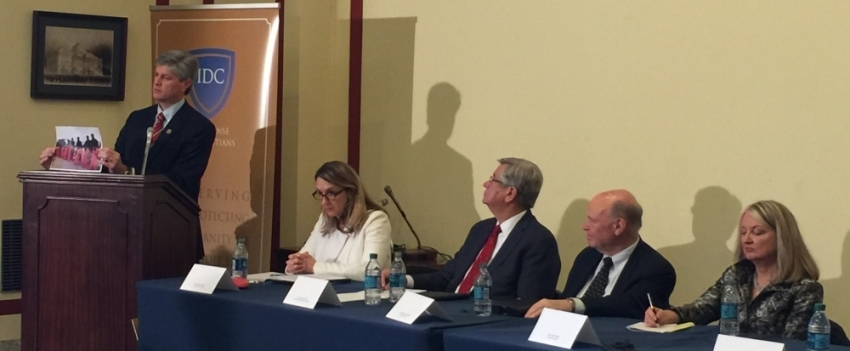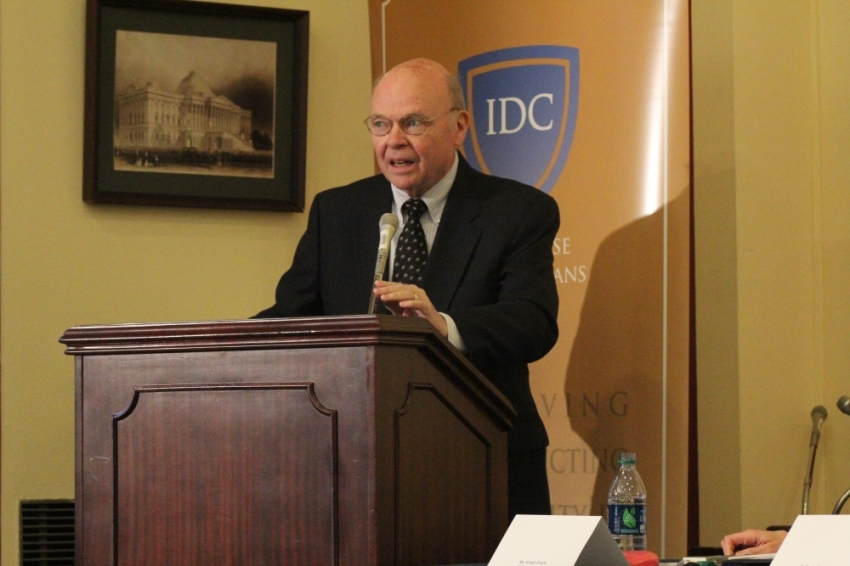Does It Matter If the U.S. Calls ISIS Violence Against Christians 'Genocide'?

WASHINGTON — Members of the U.S. House of Representatives and prominent human rights activists gathered on Capitol Hill Wednesday to explain why it is imperative for the U.S. government to label the barbaric treatment of Christians and religious minorities by the Islamic State as "genocide."
After it was reported last month that the Obama administration failed to recognize the plight of Christians in its move to call IS' attacks against Yazidis an act of "genocide," the advocacy group In Defense of Christians felt the need to hold an panel discussion explaining why a "genocide" designation is so crucial in helping save Christians and many others from IS.
A resolution was introduced in September by Rep. Jeff Fortenberry, R-Neb., calling for the federal government to designate IS' treatment of Christians and other religious minorities as genocide and has been co-sponsored by over 160 House members, but Rep. Anna Eshoo, D-Calif., told the panel that more bipartisan support is needed to support the resolution.
Dr. Gregory Stanton, the founder of Genocide Watch and a research professor of genocide studies and prevention at George Mason University in Virginia, explained that the word "genocide" carries with it much tougher implications when it comes to international law.
"Why does the G-word matter? Why not simply call ISIS' crimes against Christians and others 'crimes against humanity?'" Stanton asked. "'Genocide' is much more powerful than 'crimes against humanity,' 'war crimes,' 'ethnic cleansing' or these ill-defined terms like 'global atrocity crimes.' Those don't even have a definition in the international law."
"'Ethnic cleansing' doesn't even exist in international law, nor does 'atrocity crimes,' whereas 'genocide' is actually in a convention." Stanton continued. "The reason why the word 'genocide' matters is because words matter. People act according to words."
Stanton added that history has shown that once the word "genocide" is used to classify atrocious crimes against humanity, it is usually followed by swift international action to stop the atrocities.

"In 2007, three epidemiologists and I counted the number of times the words genocide and ethnic cleansing were used in the New York Times, law journals, UN press releases and statements by Amnesty International and Human Rights Watch to describe four recent genocides — Bosnia, Rwanda, Kosovo and Darfur," Stanton said. "We discovered that as long as ethnic cleansing was used to describe these situations, there was no forceful action to stop them."
"As soon as the situations were called 'genocide,' forceful action resulted and ended the killings, except in one case — Darfur – where a UN Commission of Inquiry rejected the genocide word, the G-word," Stanton continued. "That is a really good example of how much it matters."
As hundreds of thousands of Christians and other religious minorities have fled from their homes and villages due to the rise of the militant group, Stanton added that the genocide designation for Christians would help make them more likely to receive preferential treatment as refugees.
"Members of such groups are much more likely to receive preferential treatment as bona fide refugees, under the UN convention and protocols on the status of refugees, to which the U.S. is a party, and under the refugee laws of the United States," Stanton said. "It gives Christians and others being targeted for genocide the presumption that they have a well-founded fear of persecution based on their religious or ethnic identity."
Nina Shea, an international human rights lawyer and senior fellow at the Hudson Institute, offered that a "genocide" designation can have huge impact on Christian families that might seek to return to their homes and villages one day.
"Yes, calling it genocide does matter. It matters for resettlement purposes," Shea stated. "It matters for restitution of property losses, for land and territory, for reparations for property and losses."
Fortenberry, who is the co-chair of the Religious Minorities in the Middle East Caucus, explained that what IS is doing to Christians is clearly genocide, just as what IS is doing to Yazidis is genocide.
"When you are being persecuted simply because of what you believe and systematically targeted for execution, there is no reason to continue to discuss this — that is genocide," Fortenberry contended. "That is an assault on the dignity of persons, it's an assault on the dignity of the collective morality of humanity. It is an assault on civilization itself."
"This is the first priority of raising international consciousness so that then [it paves the way] for further action," Fortenberry added.
Eshoo, the other co-chair of the Religious Minorities in the Middle East Caucus, said Americans take lightly the international impact that the nation can have when it stands together to decry genocidal acts of violence.
"Here at home, we take for granted so many things. Go abroad, anywhere, and what you are made aware of is that everything we say and do here matters," she stated. "People listen from across the globe. People read, people talk, people analyze what the United States of America and its people are saying."
According to a recent Marist poll, 55 percent of Americans agree that IS' targeting of Christians and other minorities fits the U.N. definition of genocide.
"I think that this is a time where future generations will measure ours," Eshoo asserted. "Did they speak out? Did they recognize this and say so?"



























